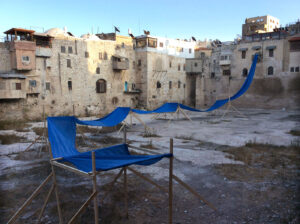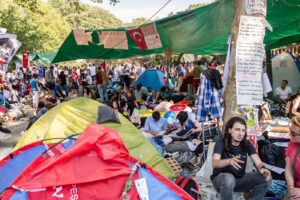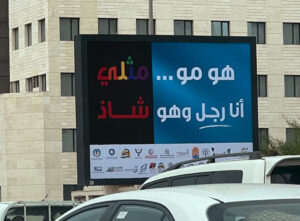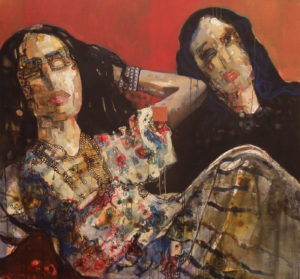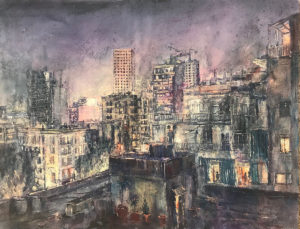Mai Al-Nakib explores memory, forgetting, and writing through the lenses of Woolf, Proust, and a Wim Wenders film.
Writing is a memory archive. Whatever its form — whether literature; love letters; laws; military operation plans; notes passed among friends; diaries; scrawls on bathroom stalls; to-do lists — writing provides a portal to lost time, to fading traces of existence. Anything, not just writing, can constitute a memory archive: trees; mountains; photographs; films; artworks; buildings; maps; stamps; fashion; music; oral tales; ruins; buried bones. But writing is the particular memory archive that has held me in its thrall since I was a young child. It is the one I have chosen to wield against forgetting, while recognizing the futility of the effort and even, at times, its harm.
We are a species that continues to exist by way of remembering, despite seeming constitutionally designed to forget. The Greek word for truth, aletheia, literally means “not forgetfulness.” The production of truth and knowledge (constructed, variable, not automatically progressive) builds upon previous archives, the work of generations documented, saved, and passed down in writing or orally. Artistic production works the same way. By excavating the past, by remembering it, art simultaneously absorbs and diverges, both learning and moving away from memory archives. Divergence and moving away from signal a form of purposeful forgetting in order to create anew. Yet I have tended to look askance at forgetting for reasons more personal and affective than intellectual and artistic.
In the late summer of 1991, the year of the liberation of Kuwait, I was twenty-one, living under petrol-black skies and volunteering at Kuwait University’s library, attempting to rebuild its archive left in tatters. The books were all gone, stolen by the invading army, but the card catalogs remained scattered across the floors and, in places, smeared inexplicably with human excrement. Our job as student volunteers was to collect the cards and arrange them by call number so that the books could be repurchased, the library restocked. The befouled cards were tossed out, unaccounted for, and any out-of-print books would never be recovered, which meant that the archive would be patchy at best. Kuwait University’s library shelves, like Kuwait itself, would remain gapped, and soon enough, these missing pieces would be forgotten.
After war, what occurs isn’t a rebuilding — an impossible task — but, rather, a new construction, an economic enterprise through which those in power have everything to gain. Initially, a clean slate mentality may pervade in a population eager to forget the traumatic event that forced the new construction to begin with. In a post-invasion Kuwait, collective forgetting took the form of ignoring the anti-democratic policies on the rise a decade earlier; turning a blind eye to harm done to the Palestinian community in Kuwait directly after; and neglecting to consider the cosmopolitanism that had characterized Kuwait since its establishment, and how this could have been used as a model for a more just community in the present.
But even new constructions following demolitions caused by invasion, occupation, or war only occur in the best worst cases: Dresden, Hiroshima, Nagasaki, Kuwait. For the Indigenous of the world, such opportunities to construct have been forbidden. The calculated theft of land and obliteration of peoples and their cultures in settler colonies have been without mercy or reprieve. In these contexts, forgetting the past is tantamount to permanent erasure, and remembering it becomes a form of resistance and steadfast resilience. This point cannot be overstated.
It was in the apocalyptic shadow of Kuwait’s war, environmental catastrophe, and encroaching amnesia that I first watched a bootleg copy of Wim Wenders’ Until the End of the World in early 1992. Set in 1999, the story unfolds in a near future threatened by an Indian nuclear satellite hurtling toward earth, endangering global survival. The film — described by Wenders as the “ultimate road movie” — is motored less by plot than by tone and rhythm. At its heart is an exploration of the relationship between memory and forgetting.
Loosely, and leaving out a flurry of subplots, the story follows the protagonist, Claire Tourneur (played by Solveig Dommartin), as she traverses the globe chasing Sam Farber, aka Trevor McPhee (William Hurt), with whom she has had a chance encounter at a videophone kiosk in Lyon. Claire is escaping ennui and a failed love affair, while Farber is on the move, continent to continent, recording images and interviews with friends and family on a technologically advanced camera. The camera, invented by his father, Dr. Henry Farber (Max von Sydow), records images seen through the viewfinder along with the viewer’s cognitive responses. Dr. Farber has invented this experimental camera to enable his blind wife, Edith (Jeanne Moreau), to see. He absconds from the Palo Alto lab he has been working for, taking with him his valuable equipment and research, once he learns that the US government wants to put the camera to nefarious use. Dr. Farber, an ophthalmologist by training, and Edith, an anthropologist, are hiding out in the Australian desert among a community of Mbantua people they have known for forty years, a number of whom are scientists working alongside Dr. Farber in his secret lab. They consider each other family.
Sam is being chased by a bounty hunter; Claire, by a detective together with her ex-boyfriend, the writer Eugene Fitzpatrick (Sam Neill), who provides voiceover throughout the film. The lot of them arrive, finally, in Australia, at Dr. Farber’s cave-lab, and his unlikely camera experiment works. Edith is able to see what Sam and Claire have recorded. The experience, while, at first, exhilarating, is not exactly what she had anticipated. As it turns out, it is unbearably sad to see the faces of those she has never seen before — including her daughters and granddaughter — or has not seen for decades (she lost her sight when she was eight years old). She continues with the experiment for the sake of her fired up, obsessive scientist husband, but the physically and emotionally draining process is wearing her down. Ultimately it proves too much for her, and she makes the decision to die; in a sense, the memories evoked by the transferred images kill her. Meanwhile, outside in the clear, starlit night on New Year’s Eve, members of the group are celebrating with music and dance the successful neutralization of the nuclear satellite and the survival of life on earth.
Unwilling to take the time to grieve his wife the way his Indigenous brother, Peter (Jimmy Little), insists he must, Dr. Farber returns to further experiments with the camera. His new investigation has to do with recording dreams. The Indigenous members of the scientific team reject the premise outright and refuse to participate. They recognize the violent colonial implications of a device that can intrude upon and capture their private memories and visions, its potential to produce new modes of exploitation. Peter protests to Dr. Farber: “Imagine what you could hang on your walls instead of my people’s paintings. You could exhibit the inside of our heads, our dreamings, and all of our old people’s secret knowledge.” One by one, Dr. Farber alienates his Indigenous team and, soon, the entire community decides to leave. Only Claire, Sam, and one white member of the scientific team, Karl, remain behind with Dr. Farber. Eugene moves into an abandoned radio station to finish his novel.
This second act of the film is the part that has haunted me for decades. Dr. Farber succeeds in recording dreams — his own, Claire’s, and Sam’s. These dreams are, in essence, memories. They are Virginia Woolf’s “moments of being,” the “scaffolding in the background,” “the invisible and silent part.” These moments shape us, make us who we are, but are often forgotten, remaining submerged or subconscious. However, as Woolf writes, “In certain favorable moods, memories — what one has forgotten — come to the top. Now if this is so, is it not possible — I often wonder — that things we have felt with great intensity have an existence independent of our minds; are in fact still in existence? And if so, will it not be possible, in time, that some device will be invented by which we can tap them?” Dr. Farber’s camera is precisely the sort of machine Woolf envisioned in 1939, on the brink of World War II, perhaps anticipating the kind of mass forgetting war both necessitates and precipitates. Necessitates because who, in their right mind, with the memory of war intact (in the case of Woolf’s generation, of World War I), would tolerate more war? Precipitates because in the aftermath of military destruction and trauma, forgetting becomes a form of protection, a necessary salve.
Dr. Farber’s camera, preserver of private memories, turns out not to be the miracle it seems. Claire and Sam lose themselves in fragments of their personal pasts. They become isolated, watching and rewatching twitchy, digitalized, vague but resonant scenes from their dreams on individual screens that anticipate our 21st century devices. They go on like this for some time, and without the intervention of Claire’s ex, Eugene, and Sam’s Indigenous brother, David (David Gulpili), they likely would have ended the way Edith did, choosing death. The film’s warning is unambiguous: solipsistic remembering is self-destructive and, when technologically enhanced, potentially fatal. Put differently, some forms of forgetting are necessary to survival.
The calculated theft of land and obliteration of peoples and their cultures in settler colonies have been without mercy or reprieve. In these contexts, forgetting the past is tantamount to permanent erasure, and remembering it becomes a form of resistance and steadfast resilience. This point cannot be overstated.
In contrast to Dr. Farber’s seeing camera and memory machine, the Mbantua people, under threat of nuclear annihilation — not the first form of annihilation they have been threatened by — make the effort to pass down sacred stories and traditional cultural knowledge to their children through the Songlines. As Dr. Farber uses his seeing camera to transfer recorded neurological visions to his wife — an isolating, painful process, and one which her Indigenous sister, Maisie Mbatchana (Justine Saunders), was staunchly against from the start — the Mbantua people come together communally to share their memory archive, their Dreamtime. The contrast between the respective processes is stark: one leading to death, the other to preserving life via shared memories and experiences. The Mbantua people refuse to allow Dr. Farber to penetrate, expose, and digitally preserve their dreamings. They don’t need or want his contraption in order to remember, even at the cost of forgetting.
That was not a lesson I was prepared to internalize when I first watched Until the End of the World. Navigating the detritus of a post-invasion Kuwait and the aftereffects of a live televised bombardment of a country — Iraq — the first of many in this region, Dr. Farber’s memory machine seemed indispensable to me. I wanted my fearless childhood back and an undespoiled Kuwait and a non-hyperreal present. Ten years later, in 2001, I lost my mother. I would have paid any price for that machine then, for a way to retrieve erased, forgotten, submerged memories of her. I would have happily sacrificed the present to escape into a past obscured by the ordinary passage of time. I would have done anything to gather those vanishing images to me, to the point of madness, into the black hole of death. Lacking Dr. Farber’s device, I instead used writing to contrive my own memory machine, plumbing the depths of a past I wasn’t ready to let go.
We have been whipped by the injunctions “never forget” and “never again” when it comes to the genocide of Jews by Nazis during World War II. It cannot be denied, however, that one outcome of this never forgetting has been the construction of an unsustainable colonial state peopled by psychopaths and sociopaths intent on doing to the Indigenous people of the occupied land of Palestine what was done so brutally to them. Never forgetting has unleashed inhumane mass destruction. Forgetting, at least in part, may have made possible an alternative, perhaps more peaceable, outcome, the kind that, at this genocidal juncture, has been rendered impossible. The Classical Greek root of the word amnesty is amnestis, that is, “not remembrance.” Palestine as a place of amnesty is what might have been if not for the tyranny of Zionist remembrance.
Involuntary remembering can be a marker of PTSD, uninvited images relentlessly flooding consciousness. Choosing or learning to forget, in this condition, can be a sign of health, letting go for the sake of the present and future, a successfully achieved reckoning. Mourning, on Freud’s understanding, would comprise just such a healthy instance of choosing to forget: first, by consciously identifying the grief for a lost love object; then, by working through that grief; and, finally, by actively letting grief go. Melancholia, on the other hand, is mourning’s more ambiguous and obsessive alternative. The lost love object is less defined, the process of letting go complicated as a result. Hazy, borderless grief is internalized in the unconscious and persists, becoming pathological. Melancholia could be considered a version of unhealthy remembering, the kind facilitated by Dr. Henry Farber’s dream device, the kind that has resulted in the decimation of Gaza. (At one point, Edith explains to Claire that she and Henry met in Lisbon as teenagers fleeing the Nazis. Henry, by then, had already lost his parents. This backstory may help explain his pathological obsession with remembering, willing to sacrifice his wife, son, and the entire Indigenous community for the sake of never forgetting.)
On the opposite end of the memory spectrum is the involuntary forgetting brought on by aging, a range of pernicious dementias stealing from the afflicted time, memory, language, and, ultimately, life itself. I have borne witness to Alzheimer’s erasing my father-in-law’s memories of Palestine, which remained vivid and present to him and, through him, to his children, until, one day, those memories evaporated into the ether of forgotten things. I bear witness today to my own father’s fight to retain memories of his thirty-year marriage to my mother, relying on conversations with me and my sisters to remind him of details that might otherwise vanish. (Both my father-in-law and my father have written private memoirs, using words to hold on to their disintegrating recollections for as long as possible. Writing used as a bulwark against forgetting, as an attempt to preserve a residue of who they once were, ultimately proves of little help to them, but to those they leave behind, it offers partial solace. They made of writing the memory archive I have always trusted it to be.)
Tucked between the wreckage of relentless remembering and the sorrows of involuntary forgetting lies Proust’s notion of involuntary memory. Proust’s understanding of involuntary memory begins, paradoxically, with forgetting. The past must be forgotten (time lost) in order for it to be remembered (regained) by way of a chance occurrence and the sensation such an occurrence may trigger. Most famously, the taste of the madeleine dipped in tea opens up a world of childhood memory for Proust, but other random moments are equally evocative: the musty smell of a toilet; stumbling on uneven paving stones; the sound of a servant knocking a spoon; the feel of a napkin on the mouth; among others. The involuntary memories (Woolf’s moments of being) such occurrences conjure up become, for Proust (as for Woolf), an inimitable source of creativity. Writing — by stitching together times and places across the dreamscape of forgetting and remembering — enables an otherwise unlikely connection between writers and readers. As Proust explains, “Instead of seeing one world only, our own, we see that world multiply itself and we have at our disposal as many worlds as there are original artists.” Against the weaponization of traumatic memory, on the one hand, or the oblivion brought on by biological ill fortune, on the other, Proust offers communion through art.
This March, I watched the director’s cut of Until the End of the World for the first time. It stretched out the original 158 minute version I had viewed in the early nineties to a version 287 minutes long, which I watched in one go. The experience was overlaid by my memory of the shorter version, along with the memories of that period of my life. I tried to immerse myself in the slower pace and more elaborate unfolding of the longer cut, to keep myself in its present. The soundtrack of the film — which was the soundtrack of my life in the first half of 1992 — made that difficult to do. (Music is, arguably, the most potent of all the memory archives, as the film itself suggests.) When I first watched it, I was on the cusp of adulthood, and my mother was still alive. As I watch now, my mother is dead, my father is old and frail, and I, like everyone else, have witnessed a genocide. At the end of the five hour screening, I weep uncontrollably.
This time around, at the dream recording part, I side with the Mbantua people. The kind of remembering I was attracted to in my early twenties is, I now believe, a pathology, an addiction, an excuse for genocidal violence. What draws my attention instead are the rich expressions of kinship, friendship, and loyalty, the bonds produced through working, traveling, and making music together, and through saving each other. Personal memories may erode, but communal, non-personal memories of a sort persist, even singular and intimate ones. What saves Claire, what pulls her out of her addiction to the dream machine, is, first, the loyalty and friendship of her ex, Eugene, and, then, Eugene sharing the manuscript of his novel with her, the film he has been narrating all along. To read herself in narrative form — a memory archive in writing that will connect her to others, even after she is long gone — is what it takes to set her free. His novel is titled Dance Around the Planet, an apt description of what life on earth has always been.
In the final scene, Claire is floating in a space lab, smiling as she receives video calls from her road trip friends wishing her a happy thirtieth birthday. Her job is to surveille our oceans for pollution crimes. Her shift in perspective from the personal to the planetary is one whose exigency is even more intense today than it was in 1991. Indigenous peoples continue to seek justice and liberation; forests and tires burn in the annual fires of summer; fascism and racism ascend again; and a genocide is being sanctioned by the most powerful nations on earth. Survival demands vision, something in the shape of a half-remembered, half-forgotten dream. Half-remembered so as not to repeat the horrors of the past. Half-forgotten in order to make space for untested ways of caring, connecting, and being human in the present, toward the preservation of our future. As Eugene, the writer, puts it, “It’s our duty to realize the future with our imagination.” And so we write until the end of the world as an act of remembering and forgetting, adding to the living memory archive against the march of death.



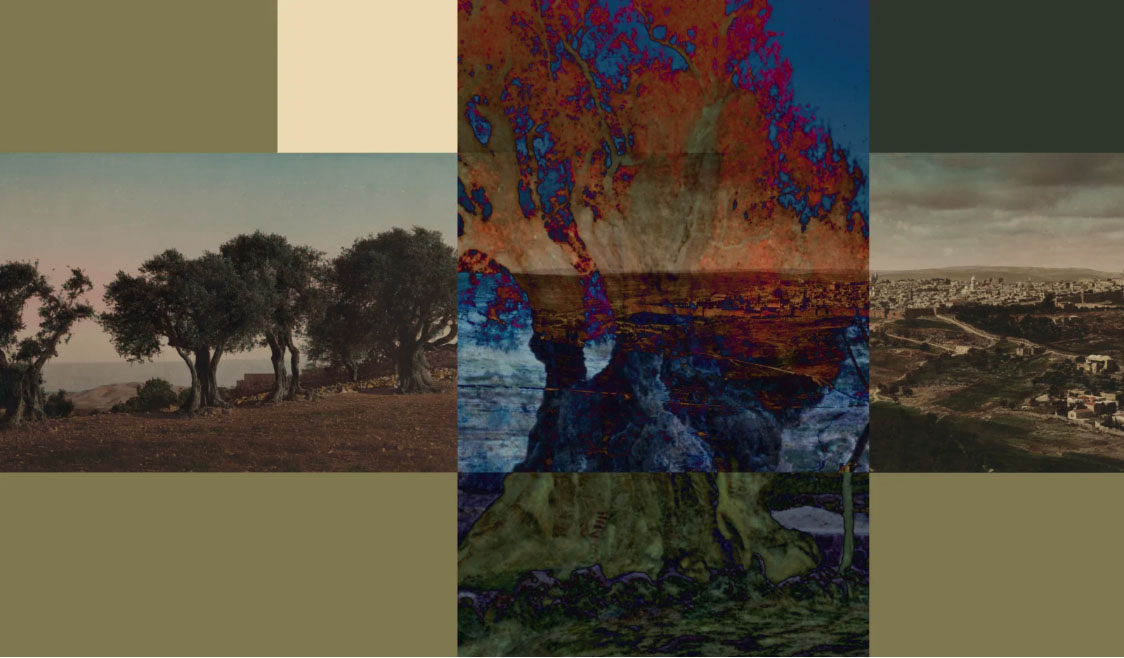
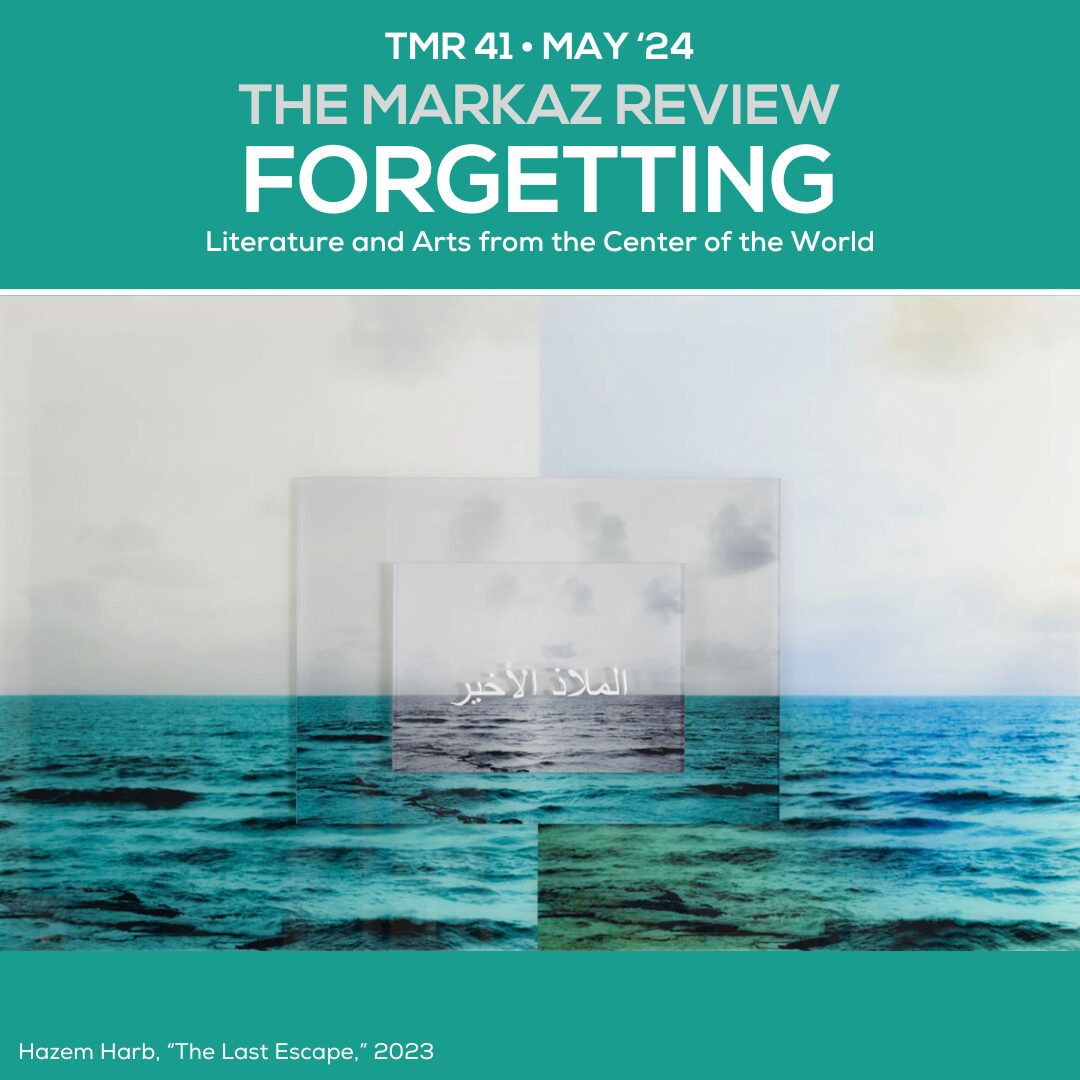
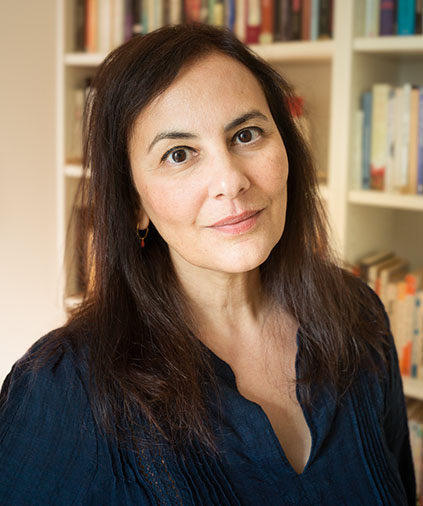



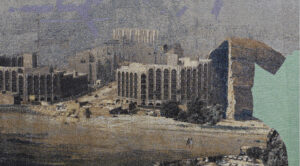







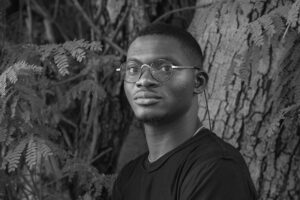























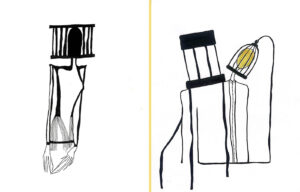















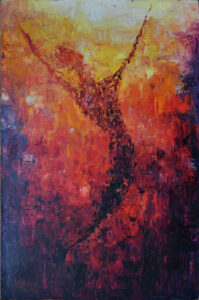


































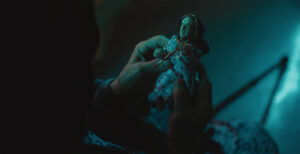




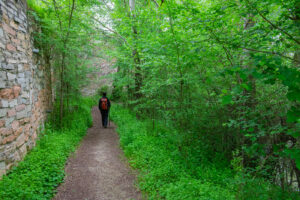
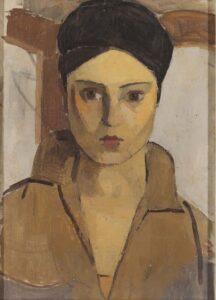





![Fady Joudah’s <em>[…]</em> Dares Us to Listen to Palestinian Words—and Silences](https://themarkaz.org/wp-content/uploads/2024/03/SAMAH-SHIHADI-DAIR-AL-QASSI-charcoal-on-paper-100x60-cm-2023-courtesy-Tabari-Artspace-300x180.jpg)

































